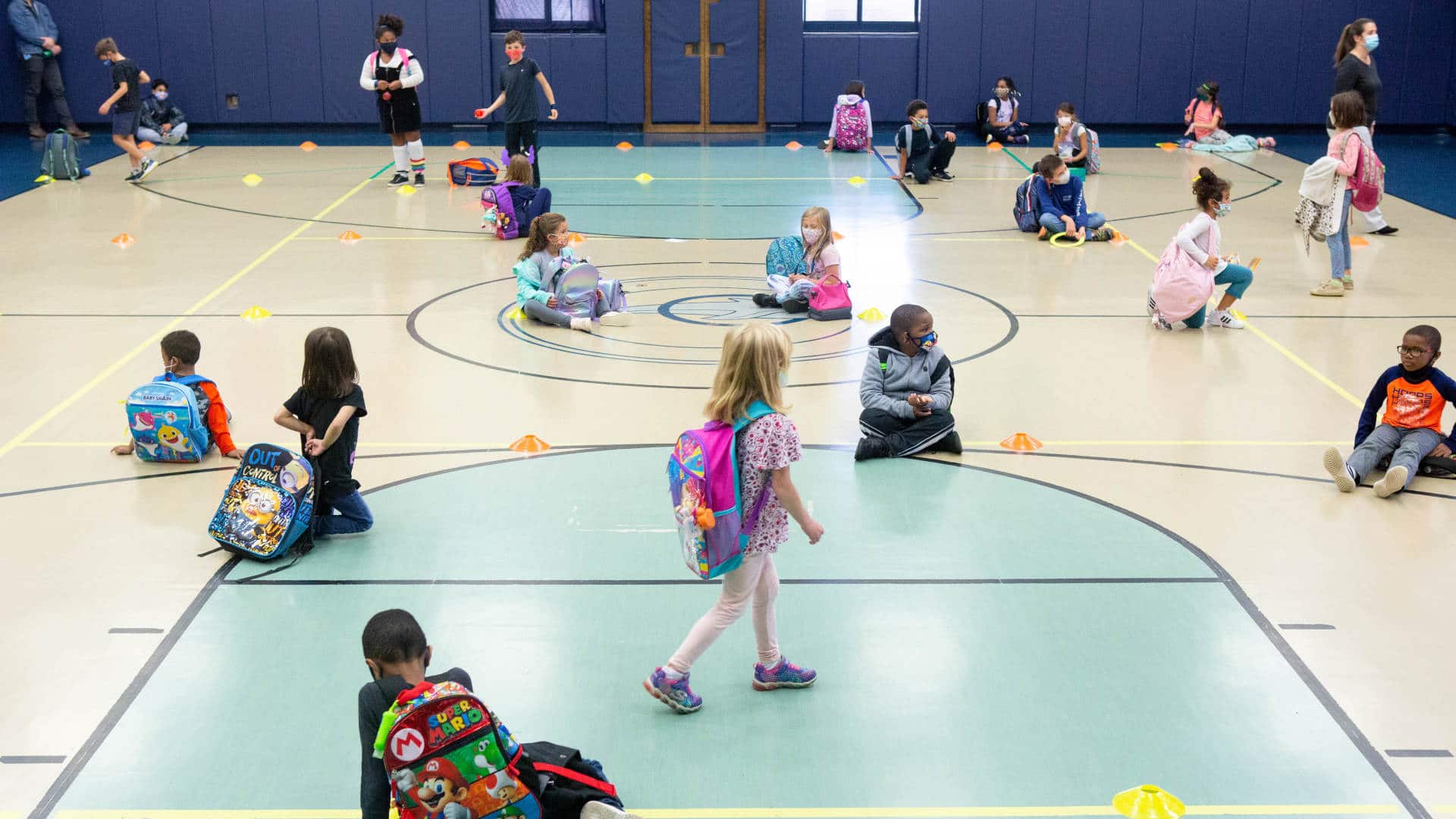As schools reopen across the United States for in-person instruction, cases of Covid-19 are rising among kids — a surge that may intensify long-running debates over pandemic safety protocols in schools, and over how, exactly, to assess the risk the coronavirus poses to children.
According to figures released recently by the American Academy of Pediatrics and the Children’s Hospital Association, children accounted for 26.8 percent of reported U.S. Covid-19 cases between Aug. 26 and Sept. 2. During a two-week period in late August and early September, the AAP/CHA team found, more than 455,000 children tested positive for Covid-19 — higher than at any previous point in the pandemic. (The report notes that “format, content, and metrics of reported Covid-19 data differed substantially by state,” and the figure may not reflect all under-18 cases.)
The rate of pediatric Covid-19 cases, the organizations wrote in a statement this week, has experienced “an exponential increase” in the past month.
The vast majority of pediatric Covid-19 cases are mild; for reasons that researchers are still trying to unravel, kids’ immune systems tend to fare better against the virus than those of adults. Still, as the delta variant has spread across the U.S., severe cases in states with low vaccination rates have strained some pediatric intensive care units — which as of 2016 had just eight beds per 100,000 children. While estimates vary, more than 400 kids have died from Covid-19 in the U.S., according to the Centers for Disease Control and Prevention.
While these Covid-19 case numbers can be alarming, placing them in context — and understanding the implications — can be more challenging. Since August 2020, Covid-19 has landed more than 55,000 children in the hospital. That’s lower than the number of children hospitalized each year with respiratory syncytial virus infection, or RSV. Car accidents and firearms remain far more common causes of death for children and adolescents than Covid-19.
None of that, of course, undoes the harm that Covid-19 causes to some children, or downplays how Covid-19, in tandem with RSV, can pressure intensive care units. And unknowns about the long-term effects of Covid-19 infection have some pediatrics experts, and parents, on edge.
Currently, only children 12 and older are eligible for Covid-19 vaccines. Vaccines for younger kids are likely months away from approval, despite growing political pressure on the Food and Drug Administration to accelerate that process. Even if vaccines for smaller children arrived, it’s not clear how widely people would want them: Despite months of eligibility, only around half of U.S. adolescents have received at least one shot.
Amid rising cases, though, there may be a growing push to get kids in the 12-to-17-year old cohort vaccinated. On Thursday, the board of the Los Angeles Unified School District, the country’s second largest, voted on a measure that would require eligible students to get the vaccine or transition to remote learning in early 2022. Parents have pushed back on the policy — but it passed with the support of seven of the eight board members.
Also in the News:
• Early this week, the U.S. Coast Guard announced that it is investigating 350 reports of oil spills across southeastern Louisiana, attributed to damage from Hurricane Ida. The announcement follows the discovery of an oil spill in the Gulf of Mexico, also due to the powerful storm, which officials from the National Oceanic and Atmospheric Administration initially saw on satellite images last week. Divers later confirmed that the oil was coming from a broken pipeline south of Port Fourchon, a key locale for the deep-water oil industry, where Ida made landfall. Meanwhile, an oil refinery near Belle Chasse, Louisiana, was also damaged by the storm, leaving an oil slick on nearby waters. Biologists have found oil-smeared birds in the area, including egrets, black-bellied whistling ducks, and blue-winged teals. And oil isn’t the only environmental water hazard in Ida’s wake: Overall, there have been more than 2,000 reports of water pollution related to the storm. A Coast Guard representative told CBS that the agency was “aware of and responding” to pollution reports. (CBS, The Washington Post)
• A new assessment of some of the world’s most important plants has highlighted the threat of species loss. The study, published this week in the journal Plants, People, Planet, analyzed 224 wild relatives of crops including potatoes, avocados, and vanilla, and found that many are threatened with extinction. Of these, vanilla is at the highest risk: All eight of its wild species are now on the International Union for the Conservation of Nature’s red list of threatened plants and animals. Also featured in the study are species of wild bean, squash, chili pepper, and husk tomatoes. The dire situation is largely attributed to land use changes in farming, invasive species, and unsustainable agricultural practices including an increased use of herbicides. Scientists mainly study wild species to help important crops adapt to changing climate and temperatures. According to The Guardian, as the average temperatures rise, crop yields around the world are expected to drop, threatening food security around the world. As wild species are threatened, scientists are also calling for improved protection and preservation of genetic diversity of the wild species by gathering plant material in gene banks, with cooperation from local people who traditionally have a better understanding of these crops. (The Guardian)
• A new report from The Global Fund, an international advocacy group that provides funding to fight AIDS, tuberculosis, and malaria, details how the Covid-19 pandemic has hampered global efforts to combat other infectious diseases. Among the report’s findings: The number of people tested and treated for TB in 2020 was 18 percent lower than in 2019. The number of people treated for drug-resistant TB fell by 19 percent, and treatment for people with especially drug-resistant TB dropped by 37 percent. The pandemic also affected HIV care, with sharp drops in the number of people seeking HIV testing and prevention services. The researchers believe the pandemic discouraged people from seeking testing or treatment, as they feared the effects of Covid-19. One of the few countries to see an increase in diagnoses of HIV was Nigeria, which, when testing for Covid-19, screened for HIV and TB as well. Delivery methods for treatments and protections against these illnesses have also had to adapt. For example, in Ouagadougou, the capital of Burkina Faso, health workers opted to stop distributing bed nets to guard against malaria in village squares, instead delivering them door to door on motorbikes. (The New York Times)
• Opening arguments began this week in the criminal trial of Elizabeth Holmes, the disgraced CEO of the former health company Theranos. The Silicon Valley startup launched in 2003, and it eventually claimed to have devised technology that could diagnose 240 different diseases from a small drop of blood. Holmes, who was 19 years old when the company launched, was at first hailed as a wunderkind, and she quickly became the subject of credulous media reports. She convinced investors to put $400 million into Theranos, which was once valued at $9 billion. But in 2015, an investigation by The Wall Street Journal called the technology into question, showing through interviews with former employees and internal emails that the device could only handle a limited number of tests and required several vials of blood. Now, Holmes faces charges of defrauding both patients and investors. Her defense opened this week by stating, among other things, that Theranos investors should have known the risks and that only a small number of the company’s tests were inaccurate; they also appealed to the jury by noting that Holmes is a new mother. The prosecutors alleged that Holmes had systematically deceived investors. When the company struggled to make payroll in 2009, assistant U.S. attorney Robert Leach told the jury: “Out of time, out of money, Elizabeth Holmes decided to lie.” (The Wall Street Journal)
• And finally: NASA’s Perseverance rover has collected a rock sample from Mars, making it the first such sample to be retrieved from another planet for transport back to Earth. The success comes after a similar collection attempt failed last month. (The rock crumbled before it could be put into a sample tube.) In this second attempt, Perseverance tried another location and pulled out a thin cylinder from a slab of rock known as “Rochette.” Engineers were able to photograph the core to make sure it was intact before sealing it in the tube a few days later. The rock, which could hold clues as to whether there was ever life on Mars, will be stored inside the rover along with any future samples, until a spacecraft can retrieve them in a later mission. “Getting the first sample under our belt is a huge milestone,” Ken Farley, the project scientist for Perseverance and a professor at the California Institute of Technology, said in a NASA press release on Monday. “When we get these samples back on Earth, they are going to tell us a great deal about some of the earliest chapters in the evolution of Mars.” (Multiple Sources)
“Also in the News” items are compiled and written by Undark staff. Brooke Borel, Lucas Haugen, Sudhi Oberoi, and Jane Roberts and contributed to this roundup.










